Sponges porifera - Study guides, Class notes & Summaries
Looking for the best study guides, study notes and summaries about Sponges porifera? On this page you'll find 107 study documents about Sponges porifera.
Page 2 out of 107 results
Sort by
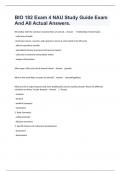
-
BIO 182 Exam 4 NAU Study Guide Exam And All Actual Answers.
- Exam (elaborations) • 15 pages • 2024
- Available in package deal
-
- $9.99
- + learn more
Be familiar with the common characteristics of animals. - Answer - Multicellular heterotrophs - cells lack cell walls -most have nerves, muscles, and capacity to move at some point in the life cycle - able to reproduce sexually - specialized sensory structures and nervous system - cells exist in extensive extracellular matrix - unique cell junctions What type of life cycle do all animals show? - Answer gametic What is the most likely ancestor of animals? - Answer choanoflag...
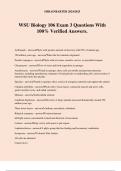
-
WSU Biology 106 Exam 3 Questions With 100% Verified Answers.
- Exam (elaborations) • 14 pages • 2024
- Available in package deal
-
- $10.49
- + learn more
WSU Biology 106 Exam 3 Questions With 100% Verified Answers. Arthropods - answerPhyla with greatest amount of diversity with 85% of animal spp 700 million years ago - answerWhen the first animals originated Porifera (sponges) - answerPhyla with no tissues, muscles, nerves, or specialized organs Choanocytes - answerFlow of water and food acquisition in sponges Amoebocytes - answerFound in sponges, these cells are mobile and perform numerous functions, including reproduction, transport of f...
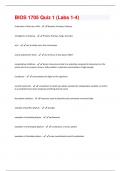
-
BIOS 1705 Quiz 1 (Labs 1-4) Questions And Answers Graded A+
- Exam (elaborations) • 8 pages • 2024
- Available in package deal
-
- $7.99
- + learn more
3 domains of the tree of life - Bacteria, Archaea, Eukarya 4 kingdoms of eukarya - Protista, Plantae, Fungi, Animalia arm - use to safely carry the microscope coarse adjustment knob - use to focus at low power ONLY competative inhibition - when molecules similar to a substrate compete for placement on the active site of an enzyme, Vmax is still possible is substrate concentration is high enough Condenser - concentrates the light on the specimen control treatment - a treatment in which you...
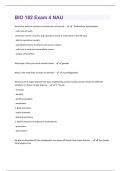
-
BIO 182 Exam 4 NAU Questions And Answers With Verified Solutions
- Exam (elaborations) • 15 pages • 2024
- Available in package deal
-
- $7.99
- + learn more
Be familiar with the common characteristics of animals. - - Multicellular heterotrophs - cells lack cell walls -most have nerves, muscles, and capacity to move at some point in the life cycle - able to reproduce sexually - specialized sensory structures and nervous system - cells exist in extensive extracellular matrix - unique cell junctions What type of life cycle do all animals show? - gametic What is the most likely ancestor of animals? - choanoflagellates What are the 3 major featu...
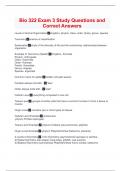
-
Bio 322 Exam 3 Study Questions and Correct Answers
- Exam (elaborations) • 15 pages • 2024
- Available in package deal
-
- $10.49
- + learn more
Levels of Animal Organizationkingdom, phylum, class, order, family, genus, species Taxonomyscience of classification Systematicsstudy of the diversity of life and the evolutionary relationships between organisms Example of Taxonomy (Spider)Kingdom- Animalia Phylum- Arthropoda Class- Arachnida Order- Araneae Family- Araneidae Genus- Argiope Species- argentata Common name for spiderGolden orb-web weaver Families always end with..."dae" Order always ends with..."eae" Cellular Level-every...
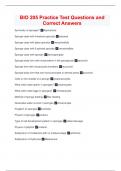
-
BIO 205 Practice Test Questions and Correct Answers
- Exam (elaborations) • 9 pages • 2024
- Available in package deal
-
- $9.49
- + learn more
Symmetry of sponges? Asymetrical Sponge class with limestone spicules calcarea Sponge class with glass spicules hexactinellida Sponge class with 6 pointed spicules hexactinellida Sponge class with spongin demospongiae Sponge body form with choanoderm in the spongocoel asconoid Sponge form with choanocyte chambers leuconoid Sponge body form that can have porocytes or dermal pores syconoid Cells on the outside of a sponge exopinacocytes What cells make sperm in sponges? choanocytes What ...
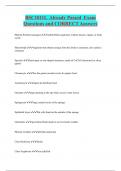
-
BSC1011L Already Passed Exam Questions and CORRECT Answers
- Exam (elaborations) • 15 pages • 2024
-
- $8.49
- + learn more
Phylum Porifera (sponges) multicellular organisms without tissues, organs, or body cavity Heterotroph organism that obtains energy from the foods it consumes; also called a consumer Spicules hard spear or star-shaped structures; made of CaCO3 (limestone) or silica (glass) Choanocyte line the gastrovascular cavity & capture food Amoebocyte digest & distribute food Osculum large opening at the top where excess water leaves Spongocoel large central cavity of the sponge
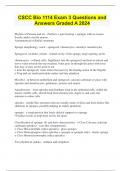
-
CSCC Bio 1114 Exam 3 Questions and Answers Graded A 2024
- Exam (elaborations) • 10 pages • 2024
-
- $14.49
- + learn more
Phylum of Parazoa and etc - Porifera = pore bearing = sponges with no tissues Sessile adults, mostly marine Asymmetrical or Radial symmetry Sponge morphology voacb - spongocel, choanocytes, mesohyl, amoebocytes Spongocel, osculum, ostium - central cavity of the sponge, large opening, pores choanocytes - collared cells; flagellated, line the spongocel and beat in unison and move water towards the top osculum; water goes in through the pores with food that may or may not be good to eat ...
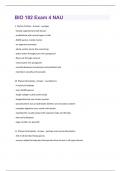
-
BIO 182 Exam 4 NAU QUESTIONS & ANSWERS RATED 100% CORRECT!!
- Exam (elaborations) • 15 pages • 2024
- Available in package deal
-
- $7.99
- + learn more
1. Phylum Porifera - Answer-- sponges - loosely organized and lack tissues - multicellular with several types of cells - 8,000 species, mostly marine - no apparent symmetry - adults sessile, larvae free-swimming - water drawn through pores into spongocoel - flows out through osculum - choanocytes line spongocoel - mesohyl between choanocytes and epithelial cells - reproduce sexually and asexually 10. Phylum Nematoda - Answer-- roundwomrs - in nearly all habitats - over 20,000 specie...
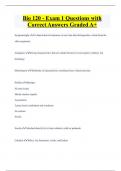
-
Bio 120 - Exam 1 Questions with Correct Answers Graded A+
- Exam (elaborations) • 39 pages • 2024
- Available in package deal
-
- $14.99
- + learn more
Bio 120 - Exam 1 Questions with Correct Answers Graded A+ Synapomorphy A shared derived character or trait state that distinguishes a clade from the other organisms. Analagous Having characteristics that are similar because of convergent evolution, not homology. Homologous Similarity in characteristics resulting from a shared ancestry. Porifera Sponges No true tissues Mostly marine, aquatic Asymmetric 2 germ layers (endoderm and ectoderm) No coelom Sessile

That summary you just bought made someone very happy. Also get paid weekly? Sell your study resources on Stuvia! Discover all about earning on Stuvia


